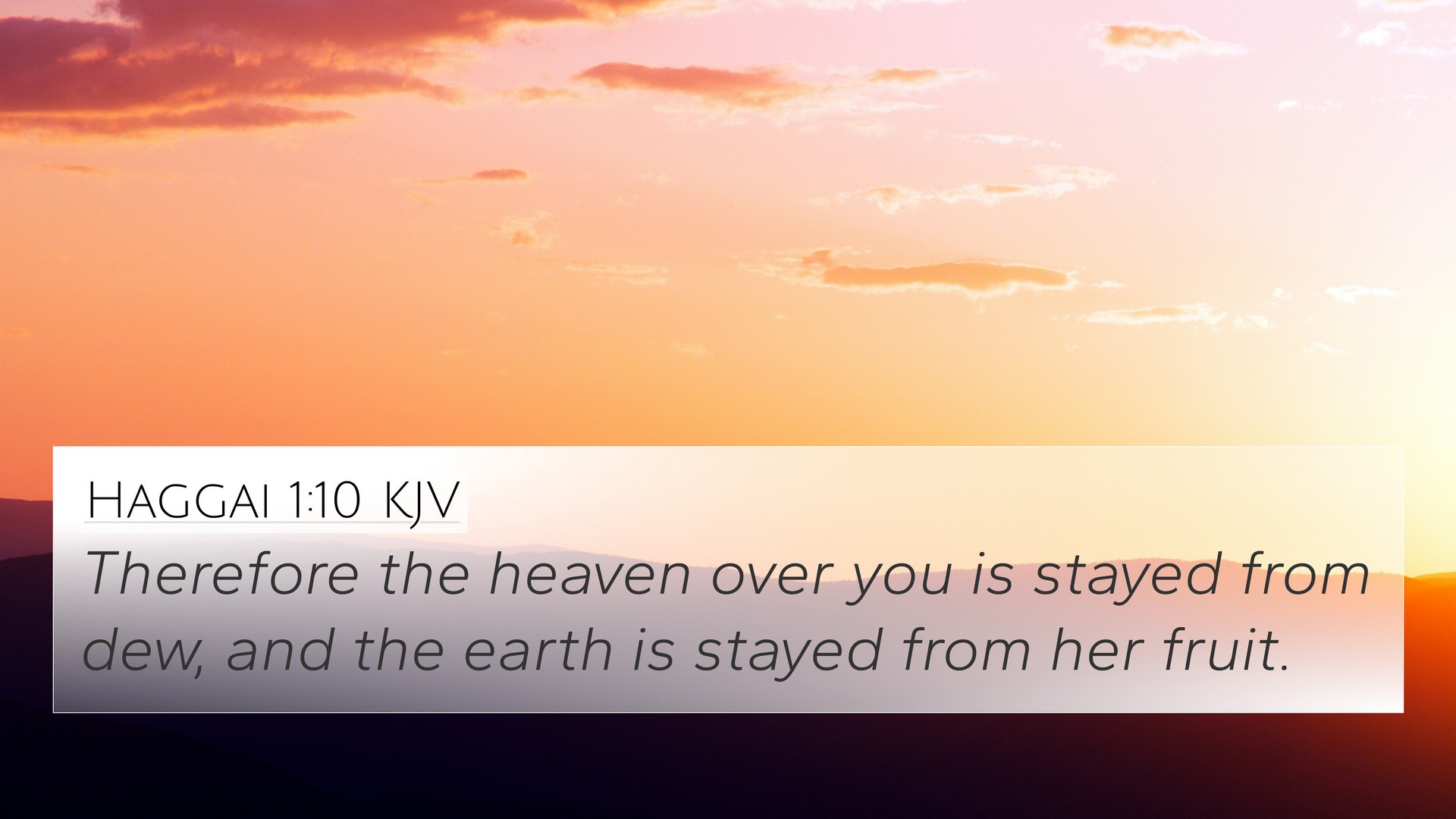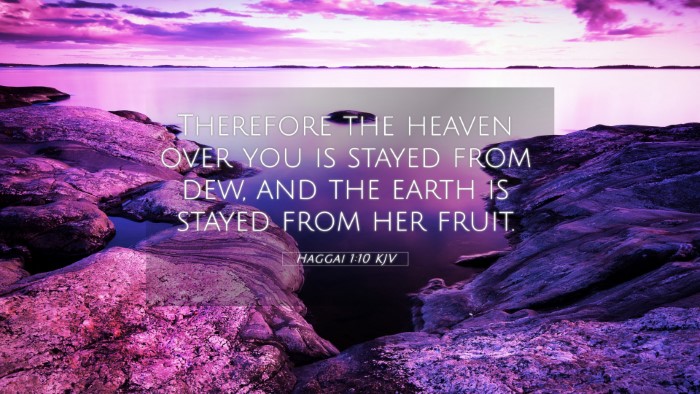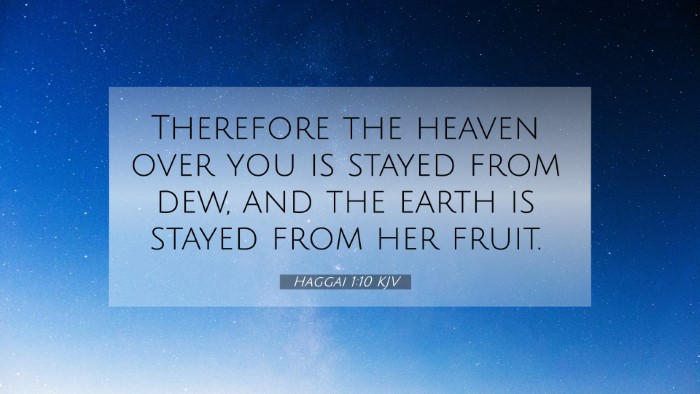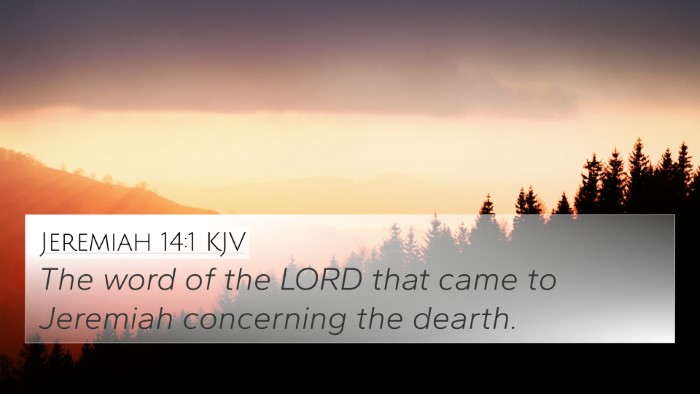Old Testament
Genesis Exodus Leviticus Numbers Deuteronomy Joshua Judges Ruth 1 Samuel 2 Samuel 1 Kings 2 Kings 1 Chronicles 2 Chronicles Ezra Nehemiah Esther Job Psalms Proverbs Ecclesiastes Song of Solomon Isaiah Jeremiah Lamentations Ezekiel Daniel Hosea Joel Amos Obadiah Jonah Micah Nahum Habakkuk Zephaniah Haggai Zechariah MalachiHaggai 1:10 Similar Verses
Haggai 1:10 Cross References
Therefore the heaven over you is stayed from dew, and the earth is stayed from her fruit.
Uncover the Rich Themes and Topics of This Bible Verse
Listed below are the Bible themes associated with Haggai 1:10. We invite you to explore each theme to gain deeper insights into the Scriptures.
Haggai 1:10 Cross Reference Verses
This section features a detailed cross-reference designed to enrich your understanding of the Scriptures. Below, you will find carefully selected verses that echo the themes and teachings related to Haggai 1:10 KJV. Click on any image to explore detailed analyses of related Bible verses and uncover deeper theological insights.
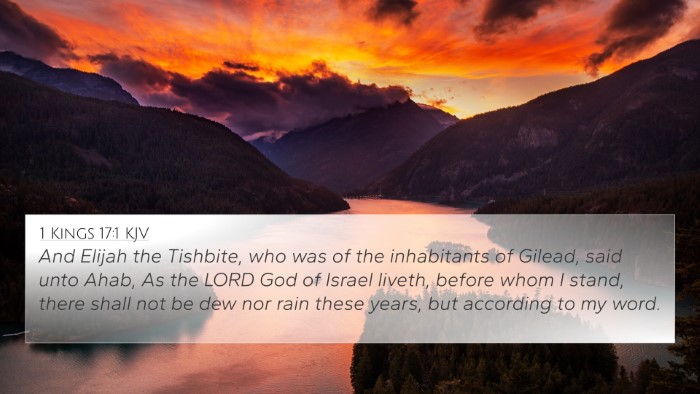
1 Kings 17:1 (KJV) »
And Elijah the Tishbite, who was of the inhabitants of Gilead, said unto Ahab, As the LORD God of Israel liveth, before whom I stand, there shall not be dew nor rain these years, but according to my word.
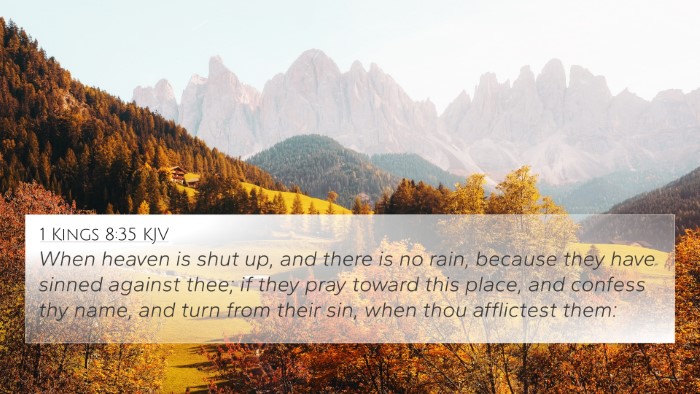
1 Kings 8:35 (KJV) »
When heaven is shut up, and there is no rain, because they have sinned against thee; if they pray toward this place, and confess thy name, and turn from their sin, when thou afflictest them:
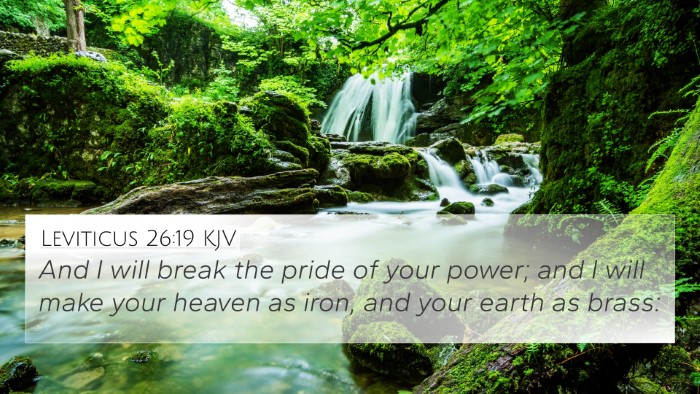
Leviticus 26:19 (KJV) »
And I will break the pride of your power; and I will make your heaven as iron, and your earth as brass:
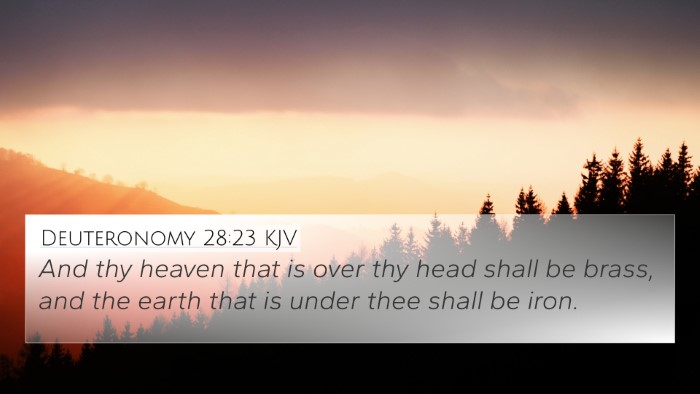
Deuteronomy 28:23 (KJV) »
And thy heaven that is over thy head shall be brass, and the earth that is under thee shall be iron.
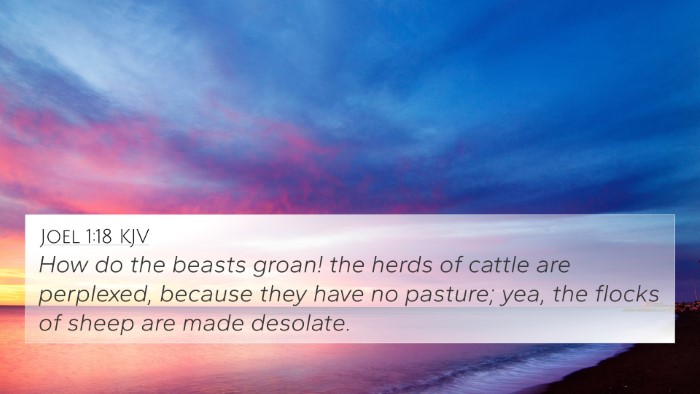
Joel 1:18 (KJV) »
How do the beasts groan! the herds of cattle are perplexed, because they have no pasture; yea, the flocks of sheep are made desolate.

Hosea 2:9 (KJV) »
Therefore will I return, and take away my corn in the time thereof, and my wine in the season thereof, and will recover my wool and my flax given to cover her nakedness.
Haggai 1:10 Verse Analysis and Similar Verses
Understanding Haggai 1:10
Verse Reference: Haggai 1:10 (KJV) - “Therefore the heaven over you is stayed from dew, and the earth is stayed from her fruit.”
This verse occurs in a context where the people of Judah have neglected the rebuilding of the Temple after their return from exile. The statement emphasizes the consequences of their disobedience and neglect of God's work.
Commentary Insights
Matthew Henry's Commentary:
Henry illustrates that the lack of dew and fruit symbolizes God's judgment caused by the people's failure to prioritize the Temple. It serves as a stark reminder that spiritual neglect yields tangible consequences in the physical realm.
Albert Barnes' Notes:
Barnes contextualizes the verse within the broader theme of divine reproach from God toward His people. He expounds on the literal and metaphorical implications of withholding blessings as a result of disobedience and the focusing of their energies on personal pursuits rather than on God's house.
Adam Clarke's Commentary:
Clarke interprets this verse as a divine pronouncement, indicating that the blessings of the earth (the dew and fruit) are directly linked to the people's faithfulness in fulfilling God's commands. His analysis points out that spiritual priorities dictate earthly prosperity.
Key Themes and Connections
This verse highlights the themes of divine judgment, neglect of duty, and the relationship between spiritual obedience and material blessings. Using scripture to cross-reference this verse provides deeper understanding:
- Malachi 3:10: "Bring ye all the tithes into the storehouse..." - Highlights the importance of putting God first.
- Deuteronomy 28:15-19: Discusses blessings and curses based on the Israelites' obedience or disobedience.
- Zechariah 8:13: "As ye were a curse among the heathen, O house of Judah..." - Affirms the consequences of unfaithfulness.
- James 4:17: "Therefore to him that knoweth to do good, and doeth it not, to him it is sin." - Stresses accountability in spiritual neglect.
- 1 Corinthians 3:9: "For we are labourers together with God..." - The theme of joint responsibility in building God's kingdom.
- Haggai 2:15: Another instance where the condition of the land is mentioned in relation to holiness.
- Proverbs 3:9-10: Promises blessings for honoring the Lord with one's possessions.
Modern Applications
This verse serves as a profound reminder of the importance of prioritizing our spiritual obligations. The neglect of one's spiritual life can lead to a withholding of blessings, both in the individual and corporate sense within the community of believers.
Additionally, this verse can inspire a deeper exploration of connections between Bible verses. By utilizing tools for Bible cross-referencing and a Bible concordance, individuals can explore thematic links, such as:
- Bible verses that relate to obedience: Luke 11:28 - "Blessed are they that hear the word of God, and keep it."
- Scriptural cross-referencing: John 15:5 - The importance of being connected to the source of life.
- Comparative analysis: Reflecting on the contrasting outcomes seen in the lives of those who obeyed God versus those who did not.
Cross-Reference Study Methods
When engaging in Bible study, understanding how to find these cross-references significantly enhances interpretation. Using a Bible cross-reference guide can facilitate:
- Identifying connections: Explore how Old Testament principles apply in the New Testament context.
- Comparative studies: Draw parallels between the prophetic writings and the teachings of the apostles.
- Thematic connections: Investigate recurring motifs such as faith, repentance, and God's faithfulness throughout scripture.
Conclusion
Haggai 1:10 serves as a significant reminder of the intertwined relationship between spiritual fidelity and earthly blessings. As believers seek to understand and live by God's word, identifying cross-references and connections becomes essential in enriching one's faith journey.
Ultimately, this encourages deeper engagement with scripture, invoking the question of what verses are related to our current lives and how we might apply divine principles more effectively.
